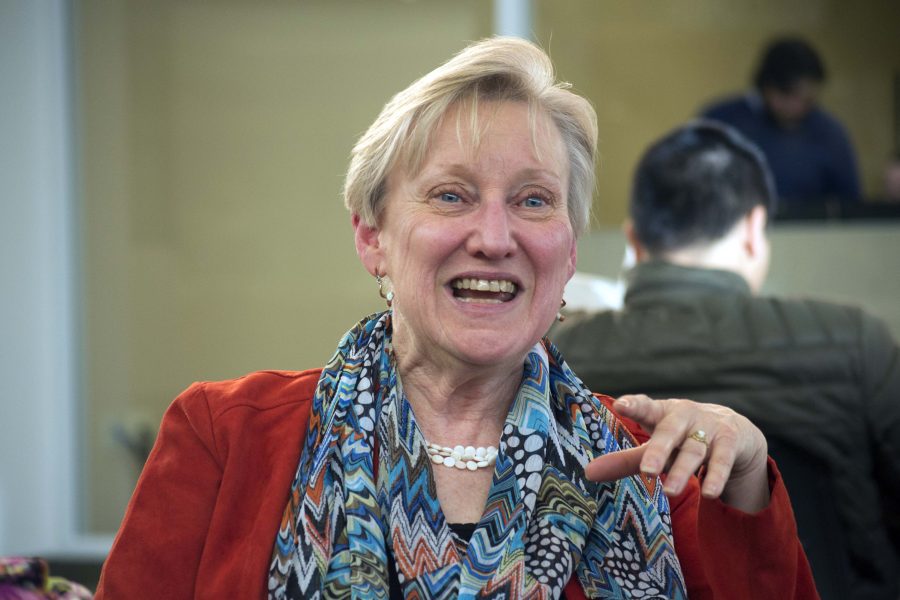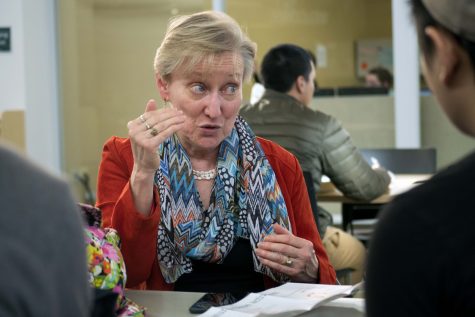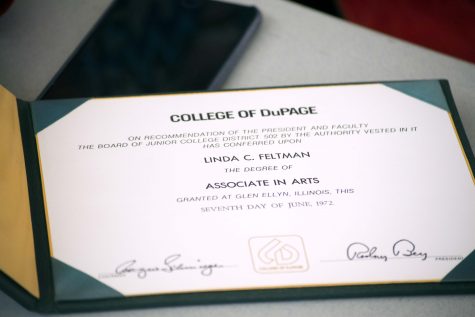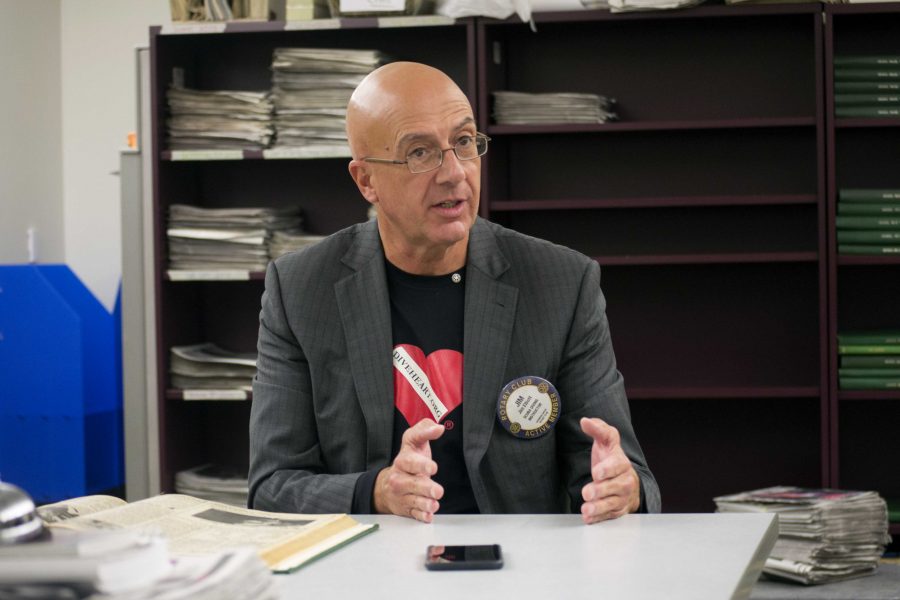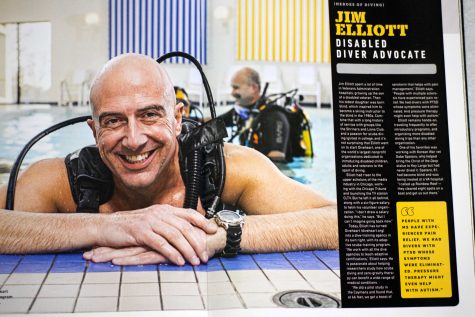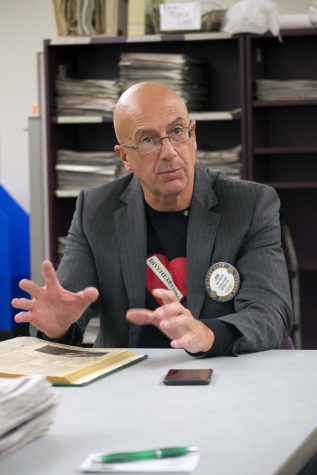Diveheart founder & Penn State entrepreneurship faculty: Courier’s Distinguished Alumni
November 16, 2016
Linda C. Feltman
Then: Courier advertisement manager, class of ‘72
Now: Coordinator for Global Entrepreneurship Week, Student Entrepreneurship Consultant, Small Business Development Center all at Pennsylvania State University
Linda C. Feltman’s family never imagined their daughter would want to attend college. Though Feltman rather had gone somewhere else, she found herself stuck with the College of DuPage. Her mustang got stuck in the mud on her first day. She went from trailer to trailer for class, but she looks back at her time at COD to be the most influential time of her life. She was nominated by Roy Grundy, a lifelong friend she met at the college. At Penn State, she has been awarded the Dean’s Excellence Award for Outstanding Faculty Affiliate twice, as well as curating the No. 1 ranked United States partner for Global Entrepreneurship Week.
Caroline: What is it like coming back to the college and seeing its growth since you graduated?
L: It’s surreal. Simply incredulous. I said earlier, I have no compass here. Courier was in a house from 1820 or something. It was cold in the winter, hot in the summer. We put up with it. We had M, K and A for buildings and a bunch of trailers. I’m incredulous. I am so proud to say I am a part of this. And I hope I have lived enough that I remember there were mentors here. All of these people, particularly [Grundy], had a piece of who I ended up being today. I look back and I think, ‘What if this hadn’t been here?’ I don’t know. My parents had no money. They were blue-collared workers. It all goes back to expectations, and they never expected their daughter to want to go to college. It was amazing. I feel so blessed to be back here and experiencing this.
C: How did you end up at COD, and how has it influenced you?
L: The reason I keep doing this is that it is so inspirational working with students. I have a lot of fun, and I feel very lucky. A lot of this goes back to COD. I look back, and if I hadn’t have gone here, I don’t know what would have happened. He’s the one that nominated me. If I had gone to one of those other colleges, I would have been lost in the crowd. The likelihood for me to be able to take it to a leadership level, this place gave me the opportunity. I had mentors here. I had people that believed in me that didn’t believe I had to get married. I got a job at the Courier, which was awesome. Gordon Richmond was my advisor. We were an awesome team, but we were wild. I look back, and it took me years to understand this, but the opportunities here, me being able to take that leadership opportunity, this was where it started. I try to give that back to my students. I try to believe in them.
Jim Elliott
Then: Sports reporter, class of ‘77
Now: Founder and President of Diveheart. Honored as the West Suburban Philanthropic Network Humanitarian of the Year.
Jim Elliott attended COD as a journalism major, covering the state championship-winning hockey team for the Courier. After graduation he was offered a job at the Chicago Tribune and moved to radio and television. Elliott followed a 20- year dream in 2001 when he founded his non-profit, Diveheart, where he works every day without collecting a salary. Elliott is a noted Rotarian and has been featured in Money magazine, Success magazine, CNN, ABC7 and more.
Caroline: How long were you on the Courier, and what was your experience like?
Jim: I came here from Downers North. Bill Kurtis spoke here and really inspired me to get serious about journalism. I went from here to Northern Illinois University. I went from writing to the advertising side. The Tribune recruited me right out of school, then moved to WGN radio and I helped start up CLTV news, then I left and started teaching people with disabilities and incorporated Diveheart in 2001.
C: What was the beginning of Diveheart like and what have you worked on?
J: I did it because my daughter is blind, and downhill skiing turned her life around. I’ve been guiding and teaching blind skiers since the ‘80s. I saw a lot of people’s lives build self-confidence and self-esteem, and skiing did it. I thought, ‘If skiing can do this, I know what diving can do because there’s no gravity.’
I was mainly thinking of people with physical disabilities. I learned how to dive here at COD. I thought it would be another arrow in my quiver as a journalist. It’s the closest thing there is to flying and being an astronaut. So, I started working with people with disabilities and had no idea it was going to go where it’s gone.
We are doing research with university medical centers all over the country. We found there’s an extra output of serotonin in the human body if we get people deep enough. It helps with pain management and anxiety. People with chronic spinal pain for 10 or 15 years, if we get them deep enough, they can be pain free for up to three weeks.
We did the first study of autism and scuba therapy with Northwestern University. It’s pretty exciting. We became a training program. I just got back from Malaysia yesterday, and we were training people there, then took people with disabilities on a trip as well. We teach instructors all over the world. We’ve done programs in China, Australia, Israel, the UK, all over the Caribbean, hundreds of cities in the US. We’ve spun off 25 other non-profits to do similar stuff that we do.
I used all the skills I learned at COD as a journalist and also throughout my media career. I use all those tools to help make things happen with Diveheart. It’s been very exciting.
C: You mention you and your daughter downhill skiing together being an inspiration, how did you two find downhill skiing?
J: When they mainstreamed [Erin] with sighted kids, they teased her on the playground because her eyes darted back and forth. They never learned to track right. She could technically read a two inch letter about half an inch from her right eye, so she said, ‘I can read. I’m like everybody else. I don’t understand why they’re teasing me.’ She threw down her cane and refused to learn braille. So now I was like, well, what do I do with this blind kid who doesn’t want to be blind?
I was at WGN radio at the time. An announcer said, ‘I’m going to hook you up with this guy who does downhill skiing.’ So when she’d go back to school the kids would ask her, ‘What did you do over the weekend?’ And she’d say, ‘Oh, I went skiing.’ All of a sudden she was the cool kid.
It’s really interesting, research has shown the very first pull session is really powerful. It’s not Johnny in the wheelchair; it’s Johnny the scuba diver, and then he goes, ‘Wow, what else can I do?’ We’ve had a lot of people who have very sedentary lifestyles go on to do really cool stuff because they go, ‘If I can scuba dive, I can do anything.’ So few people dive. It’s really cool when somebody with a disability can do it.
C: How did you make the move from media to a non-profit?
J: Since the ‘80s I had been wondering how we could do the same thing with diving as we were skiing. When the kids were grown and gone, I kind of pulled the trigger. I was divorced, and I thought if I left with my best year in TV, if I screw up, I could just go back. Luckily I didn’t screw up, and here we are.
Later this month, we are talking to the city of Aurora and a developer about building the world’s deepest warm water pool to replicate some of the things we’ve seen. At Hopkins, we found the serotonin thing, and we’ve been at it for a while. We’ve been after it since ’08. It all started here with journalism and with scuba diving.
C: How does it feel coming back and seeing COD now as a Distinguished Alumni?
J: It was trailers. It’s cool. It’s so cool to be here for this reason and to be able to work with all the different departments to work on things we want to do. We want to have interns from COD. I’d love to help students in all the areas we’re good at like PR and marketing. It’s really a huge honor. They had quite a few nominations.



